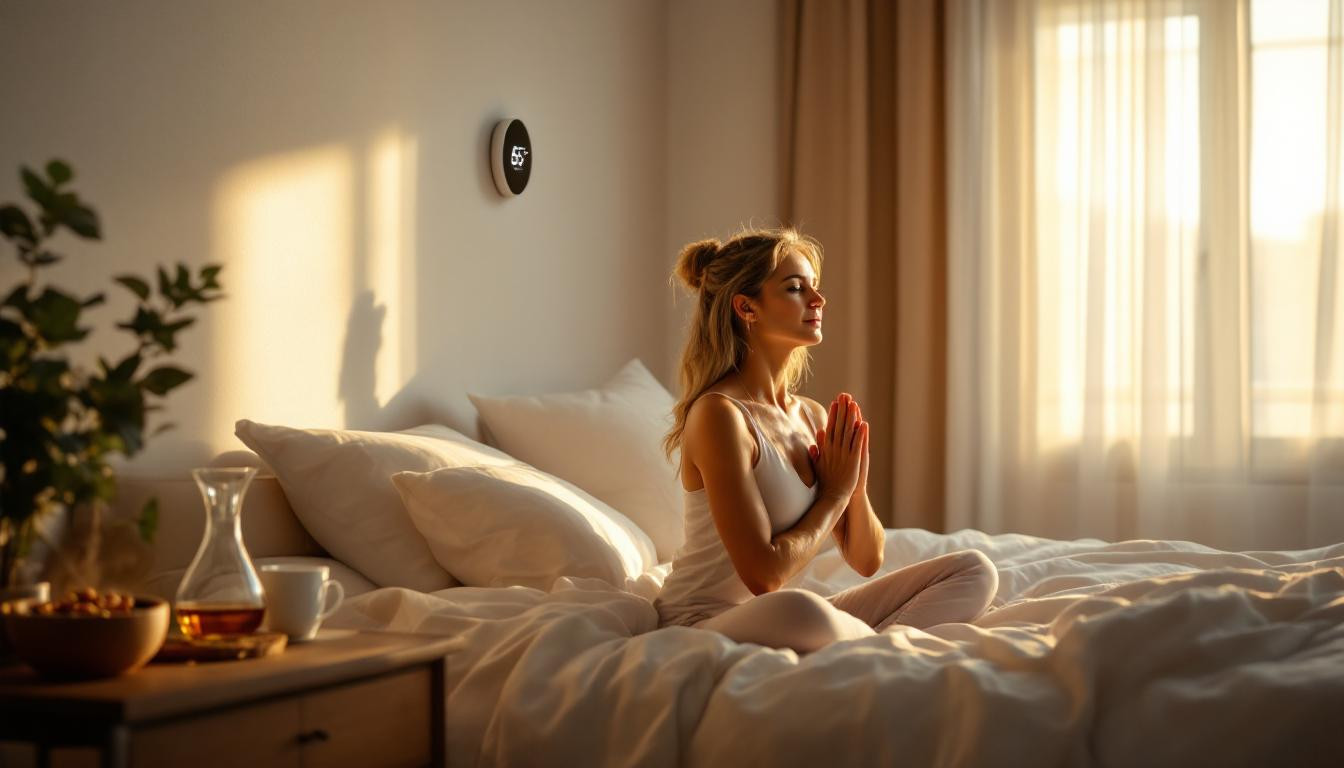Your body feels tired, yet sleep remains elusive. If you’re navigating the challenging waters of post-menopausal sleep disturbances, you’re not alone. Nearly 60% of women experience significant sleep issues after menopause, but there are effective solutions that can transform your nights. Let’s uncover the secrets to reclaiming restorative sleep during this new chapter of life.
Why menopause disrupts your sleep patterns
The dramatic decline in estrogen and progesterone during menopause doesn’t just end reproductive cycles—it fundamentally alters sleep architecture. “Hormonal fluctuations directly impact the brain’s sleep regulation centers, often extending the time it takes to fall asleep and reducing deep sleep phases,” explains Dr. Melissa Hanson, sleep specialist at Austin Women’s Health Center.
These hormonal changes trigger those infamous night sweats and hot flashes that can jolt you awake multiple times nightly, creating a frustrating cycle of sleep disruption.
Create your perfect sleep sanctuary
Your bedroom environment plays a crucial role in managing menopausal sleep disturbances. Transform your sleeping space into a cool, dark sanctuary with these essential adjustments:
- Set your thermostat between 65-68°F (18-20°C)
- Invest in moisture-wicking, breathable bedding
- Remove electronic devices that emit blue light
- Use blackout curtains to block disruptive light
The evening ritual that signals your brain it’s time to rest
Establishing a consistent pre-sleep routine acts like a lullaby for your nervous system. Begin winding down 60-90 minutes before bed with gentle activities that transition your mind from alertness to relaxation.
“The brain responds remarkably well to predictable patterns,” notes Dr. Rachel Winters, neurologist specializing in women’s health. “A consistent bedtime ritual essentially reprograms your neural pathways to recognize sleep cues more effectively.”
Movement medicine: The exercise connection
Regular physical activity works like a natural sleep aid, reducing the severity of hot flashes and promoting deeper sleep cycles. One patient, Margaret, shared: “After incorporating yoga poses into my routine after 50, not only did my balance improve, but my sleep quality transformed dramatically.”
The key is timing—complete vigorous exercise at least 3-4 hours before bedtime, allowing your body temperature and heart rate to return to baseline levels.
Nutritional strategies that promote sleep
Your dinner plate significantly impacts your sleep quality. Think of your evening meal as setting the stage for sleep—light props promote a smooth performance, while heavy scenery creates obstacles.
- Choose magnesium-rich foods (leafy greens, nuts, seeds)
- Limit caffeine after noon
- Avoid alcohol within 3 hours of bedtime
- Stay hydrated during the day, but taper fluids in the evening
Mind-body practices that calm the nervous system
Practices like meditation and gentle yoga poses like cat-cow can significantly reduce cortisol levels, helping your body transition into sleep mode. These techniques work like a dimmer switch for your nervous system, gradually turning down stress responses that interfere with sleep.
When to consider discussing hormone therapy
For some women, lifestyle modifications alone aren’t sufficient. If sleep disruptions significantly impact your quality of life, discussing hormone replacement therapy with your healthcare provider might be appropriate.
After trying numerous natural remedies without success, Helen finally consulted her doctor about hormonal options. “Within weeks of starting low-dose hormone therapy, my night sweats decreased by 80%, and I began sleeping through the night for the first time in years.”
The surprising connection between brain health and sleep
Engaging your brain during waking hours can improve nighttime sleep quality. Regular brain exercises and cognitive activities strengthen neural pathways that support healthy sleep-wake cycles.
Similarly, addressing any physical discomfort like back pain can remove significant barriers to quality sleep.
Finding your personal sleep solution
Just as exercise affects individual happiness differently, your optimal sleep strategy will be uniquely yours. Experiment with different combinations of these approaches, tracking improvements to discover what works best for your body’s specific needs.
How might reclaiming restful sleep transform your post-menopausal years? With these evidence-based strategies and a bit of patience, you can transition from counting sheep to enjoying deep, restorative sleep—rediscovering energy and vitality during this new chapter of life.
